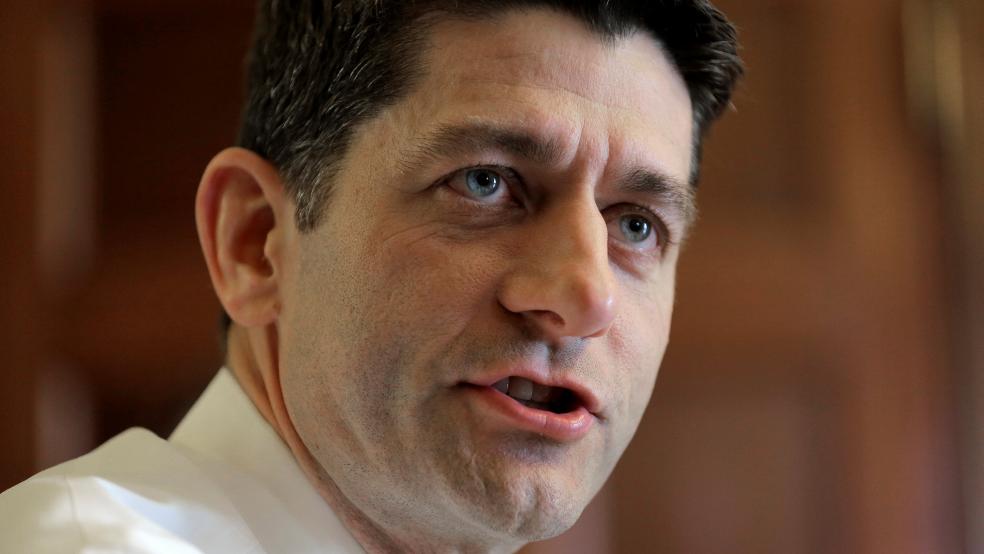In a radio interview on Monday, House Speaker Paul Ryan got a preview of the damning question he and other senior Republican Party figures who have supported Donald Trump’s presidential candidacy can expect to be asked well after the election, regardless of today’s outcome.
How can you justify your support of a candidate for president whose behavior you have regularly declared not just unacceptable, but even sickening?
Related: Has Trump Put Michigan and Minnesota in Play? Probably Not
Ryan appeared on the show hosted by Wisconsin’s conservative icon Charlie Sykes for a discussion of the state of the election, and the conversation naturally turned to the GOP nominee, whom Sykes has refused to support since the primaries.
Sykes ran through a list of things Trump has done during the campaign that Ryan has been forced to disavow. He noted that Ryan called Trump’s insistence that a Mexican-American judge couldn’t be impartial “textbook racism” and said that he was “sickened” when a video was released showing Trump bragging about how he sexually assaults women. He reminded Ryan that he had said, earlier in the campaign, that he would no longer campaign for Trump or support his candidacy, even though he would still vote for him.
Then he asked the speaker about a recent report in Politico that he had recently offered to appear with Trump at a rally in Wisconsin, and had begun issuing strongly worded statements of support for the GOP nominee, urging people to vote for him by name.
“What’s changed for you?” Sykes asked. “Why would you not have been appearing with him then, and willing to do so now?”
Related: Stocks Soar as Investors Bet on a Clinton Victory
“Let me answer your question with a question,” Ryan began. “What do you think helps [Wisconsin Sen.] Ron Johnson, [Wisconsin Rep.] Mike Gallagher, all of our candidates across the country more in the closing two days of an election? Having party discord? Having party leaders snub each other and going after each other? Or unifying the Republican Party and focusing and prosecuting our campaign against Hillary Clinton? What helps Republicans more? Infighting or unifying? I don’t want to harm our team going into the election. I want to unify our team...so that as many of our candidates as possible can win this election.”
Ryan, like other establishment Republicans, has been caught between the proverbial rock and hard place. If he went all in for Trump, the candidate that blew away the competition in the primary, he would be supporting someone who would increase the national debt, who has divided the country, and who ignored the GOP post-mortem from the last presidential election that set a mandate for inclusion among African Americans and Latinos. If he denied Trump, he risked splitting the party down the middle.
Sykes asked if the Republican Party is now the party of Trump.
“It is no one person’s party,” Ryan said. “Donald Trump won the primary fair and square. As a party leader, as the highest elected official in the party, I have always felt a duty to the process, to democracy, to the primary voter that must be respected. And he won this fair and square. But no one person controls this party. This is a bottom-up, organic, grassroots party based on conservative principles.”
Ryan insisted, against considerable evidence, that Trump supports the “Better Way” agenda that Ryan has been pushing throughout the election, offering that as a good reason to support him.
Related: Trump Awakens a Sleeping Giant: Record Turnout for Latino Voters
“He does support our agenda,” he said. “He may not talk about it or run on it, but he does support our Better Way agenda.”
“Then,” he added, “The one thing we should never, ever do is jettison our principles, even if it’s expedient, even if it makes sense for some popular reason for the moment.”
That, evidently, was a bridge too far for Sykes.
“But isn’t that what you’re doing right now?” he asked.
“No, I’m not,” Ryan said. “I’m actually running on an agenda that advances our principles.”
Related: FBI’s Comey: Never Mind About That Clinton Email Bombshell
But Sykes, in his understated Midwestern way, had shown Ryan where he and a generation of Republican leaders could be vulnerable in the future. Supporting Trump while at the same time deploring racism and sexual assault isn’t a logically tenable position, and to longtime conservatives like Sykes, it isn’t a morally tenable one either.





